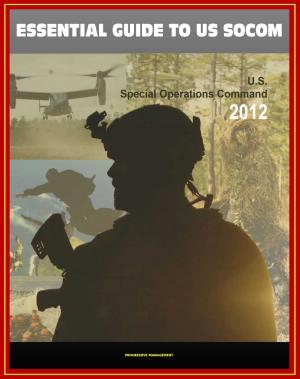Crossing the Line of Departure: Battle Command on the Move, A Historical Perspective - Ancient Times, Genghis Khan, Yorktown, Civil War, World War I and II Industrial Age, Vietnam, Gulf War, Iraq War
Nonfiction, History, Military, Vietnam War, Asian| Author: | Progressive Management | ISBN: | 9781310302503 |
| Publisher: | Progressive Management | Publication: | July 6, 2016 |
| Imprint: | Smashwords Edition | Language: | English |
| Author: | Progressive Management |
| ISBN: | 9781310302503 |
| Publisher: | Progressive Management |
| Publication: | July 6, 2016 |
| Imprint: | Smashwords Edition |
| Language: | English |
This excellent report, a wide-ranging historical overview of that most difficult aspect of military leadership, the art of battle command, has been professionally converted for accurate flowing-text e-book format reproduction. McGrath leads the reader through case studies beginning with Alexander the Great leading up to the recent war in Iraq. Among others, he analyzes Napoleon's technique, French and British practices in World War I, the German experience with "Blitzkreig" in World War II, and the Soviet approach to battle command. McGrath also extends his historical analysis to the present day by presenting a description of battle command theory in the "Modular Army" and the Information Age. Through it all, he finds that the key to successful command in battle, particularly in mobile operations, is found in the successful interplay between technology and personal technique.
Unlike some pundits today, McGrath does not conclude that information age technology is likely to shift the balance between these poles in favor of technology dependence. The commander's personal sense of where to be on the battlefield, where to locate and how to use his headquarters staffs, and how to communicate with his subordinates have been—and remain today—crucial elements of successful battle command. A 21st century commander has use of technology beyond the comprehension of an Alexander, a Napoleon, or a Guderian; but he will continue to grapple with the same issues of personal presence and technique that they mastered so well. Crossing the Line of Departure brings to the fore insights, trends, and leadership qualities needed for successful battle command. While possessing knowledge of these traits does not guarantee success on the battlefield, their absence will almost assuredly bring defeat.
INTRODUCTION * Battle Command on the Move and Army Doctrine * Summary * BATTLE COMMAND IN THE AGE OF THE HORSE (Antiquity to Napoleon) * Ancient Times * Genghis Khan and Mobile Leadership * Napoleon and Battle Command on the Move * Summary * THE AMERICAN EXPERIENCE TO 1861 * The Yorktown Maneuver, 1781 * Advance On Mexico City, 1847 * Summary * MOBILE BATTLE COMMAND IN THE AMERICAN CIVIL WAR AND AFTER * Grant's Move on Petersburg, June 1864 * The Appomattox Campaign, 1865 * Mobile Command in the Indian Wars 1865-1890 and Beyond * Summary * BATTLE COMMAND IN THE INDUSTRIAL AGE * World War I Battle Command * France 1914: Lack of Command and Control Defeats a German Mobile Operation * Development of New Style Infantry Tactics * World War II and Korean War Infantry Battle Command * Summary * ARMORED AND AIRBORNE MOBILE OPERATIONS BATTLE COMMAND 1939-45 * Blitzkrieg Command and Control - German Theory and Practice for Command of Mobile Units Conducting Mobile Operation * US Army World War II Mobile Operations Battle Command Theory and Practice * The First Modern US Army Mobile Campaign-Brittany, August 1944 * Summary * BATTLE COMMAND IN VIETNAM 1965-72 * Command and Control by Helicopter * Operation PEGASUS: Battle Command on the Move in Airmobile Operations * Summary * BATTLE COMMAND IN THE 1973 ARAB-ISRAELI WAR * The Battle of El Firdan * The Battle of the Chinese Farm/Suez Crossing * Summary * THE SOVIET APPROACH TO MOBILE BATTLE COMMAND * Battle Command on the Move By the Numbers * Artillery Offensive * The Soviet Approach in Other Armies * Summary * MODERN US ARMY BATTLE COMMAND AND COMMAND POST THEORY AND ORGANIZATION * Command Post Theory versus Actual Organization * Command and Command Post Vehicles * Summary * MOBILE BATTLE COMMAND IN MODERN US ARMY OPERATIONS 1991-2003 * The 1991 Gulf War * The Baghdad Campaign, 2003 * Summary * BATTLE COMMAND IN THE AGE OF THE MODULAR ARMY * Lessons From Iraq * Modularity * Summary * CONCLUSION
This excellent report, a wide-ranging historical overview of that most difficult aspect of military leadership, the art of battle command, has been professionally converted for accurate flowing-text e-book format reproduction. McGrath leads the reader through case studies beginning with Alexander the Great leading up to the recent war in Iraq. Among others, he analyzes Napoleon's technique, French and British practices in World War I, the German experience with "Blitzkreig" in World War II, and the Soviet approach to battle command. McGrath also extends his historical analysis to the present day by presenting a description of battle command theory in the "Modular Army" and the Information Age. Through it all, he finds that the key to successful command in battle, particularly in mobile operations, is found in the successful interplay between technology and personal technique.
Unlike some pundits today, McGrath does not conclude that information age technology is likely to shift the balance between these poles in favor of technology dependence. The commander's personal sense of where to be on the battlefield, where to locate and how to use his headquarters staffs, and how to communicate with his subordinates have been—and remain today—crucial elements of successful battle command. A 21st century commander has use of technology beyond the comprehension of an Alexander, a Napoleon, or a Guderian; but he will continue to grapple with the same issues of personal presence and technique that they mastered so well. Crossing the Line of Departure brings to the fore insights, trends, and leadership qualities needed for successful battle command. While possessing knowledge of these traits does not guarantee success on the battlefield, their absence will almost assuredly bring defeat.
INTRODUCTION * Battle Command on the Move and Army Doctrine * Summary * BATTLE COMMAND IN THE AGE OF THE HORSE (Antiquity to Napoleon) * Ancient Times * Genghis Khan and Mobile Leadership * Napoleon and Battle Command on the Move * Summary * THE AMERICAN EXPERIENCE TO 1861 * The Yorktown Maneuver, 1781 * Advance On Mexico City, 1847 * Summary * MOBILE BATTLE COMMAND IN THE AMERICAN CIVIL WAR AND AFTER * Grant's Move on Petersburg, June 1864 * The Appomattox Campaign, 1865 * Mobile Command in the Indian Wars 1865-1890 and Beyond * Summary * BATTLE COMMAND IN THE INDUSTRIAL AGE * World War I Battle Command * France 1914: Lack of Command and Control Defeats a German Mobile Operation * Development of New Style Infantry Tactics * World War II and Korean War Infantry Battle Command * Summary * ARMORED AND AIRBORNE MOBILE OPERATIONS BATTLE COMMAND 1939-45 * Blitzkrieg Command and Control - German Theory and Practice for Command of Mobile Units Conducting Mobile Operation * US Army World War II Mobile Operations Battle Command Theory and Practice * The First Modern US Army Mobile Campaign-Brittany, August 1944 * Summary * BATTLE COMMAND IN VIETNAM 1965-72 * Command and Control by Helicopter * Operation PEGASUS: Battle Command on the Move in Airmobile Operations * Summary * BATTLE COMMAND IN THE 1973 ARAB-ISRAELI WAR * The Battle of El Firdan * The Battle of the Chinese Farm/Suez Crossing * Summary * THE SOVIET APPROACH TO MOBILE BATTLE COMMAND * Battle Command on the Move By the Numbers * Artillery Offensive * The Soviet Approach in Other Armies * Summary * MODERN US ARMY BATTLE COMMAND AND COMMAND POST THEORY AND ORGANIZATION * Command Post Theory versus Actual Organization * Command and Command Post Vehicles * Summary * MOBILE BATTLE COMMAND IN MODERN US ARMY OPERATIONS 1991-2003 * The 1991 Gulf War * The Baghdad Campaign, 2003 * Summary * BATTLE COMMAND IN THE AGE OF THE MODULAR ARMY * Lessons From Iraq * Modularity * Summary * CONCLUSION















